asking and answering questions.ppt
Unit-5-Preparing-a-Speech

理学院
Contents
Brief Introduction of Conference & Obtaining Conference Information
Keeping up Pre-/Post- conference Correspondence
Part II Preparing your slide
Light letters against a dark background also work.
Many experts feel that a dark blue or black background works best for talks in a large room.
Part II Preparing your slide
• colourful, interesting transparencies • but not too multi-coloured • fonts: not more than 3 in one slide • readable transparencies:
The listener gets to know things which are new to him and give him the feeling that he profits from the lecture.
He hears things which completely incomprehensible to him to make him retain his respect of science.
Part II Preparing your slide
Unit1PartALet'stalkLookaskandanswer(课件)四年级英语下学期(人教

Where is the teachers’ office? Look and point. It’s on the first floor.
This is the first floor.
This is the second floor.
Is Miss White’s office on the first floor? Now read and answer. No, it isn’t. It’s on the second floor.
He wants to go to the teachers’ office.
teachers’ office
The teachers’ office is big.
Why does Mike want to go to the teachers’ office? Now watch and answer. He wants to hand in his homework.
desk door
Today Mike is back to school. He is talking with his teachers.
How many people are there in the dialogue? Now listen and answer. Four. Where does Mike want to go? Listen again and answer.
( A ) 3. Classroom 3 is ______ the second floor.
A. on
B. in
C. next to
核心词汇 和短语
library,homework, next to, teachers’ office, first/second floor
商务英语课程课件Unit2
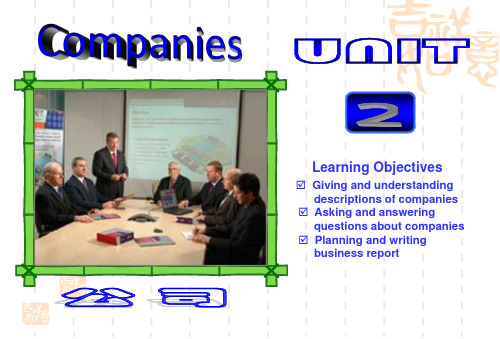
● Telecommunications / Media ● Vehicle manufacturing ● IT / Electronics ● Engineering ● Construction ● Pharmaceutical ● Energy ● Airline ● Other
Can you match the types of business in the box to the pictures?
2.1.2. Listen to the first part of a talk about ACT Systems
Corporation and complete the following fact sheet.
ACT Systems Corporation
Headquarters in __S_a_n_F_r_an_c_is_c_o_ Specializes in __m_e_c_h_a_ni_ca_l_t_es_t_in_g_&__si_m_u_la_ti_o_n_e_q_ui_p_m_e_n_t __ Factories located in ___U_S, Britain , ___F_r_a_nc,e___G_e_r_many
1) When it was started or founded and who its founder was. 2)What is the company’s line of business? 3)What products it makes or what services it provides. 4)Its sales figures. 5) Its structure. 6)How many people work for it: how many employees it has. 7)Where its headquarters are: where it is based. 8)Whether it does business overseas. 9)Where its factories or plants are located (if it’s a manufacturing company). 10)How many branches or retail outlets( shops) it has (if it’s a retail organization). 11)Whether it sells business-to-business, or whether it’s a retail organization selling to
五年级上册第1单元英语
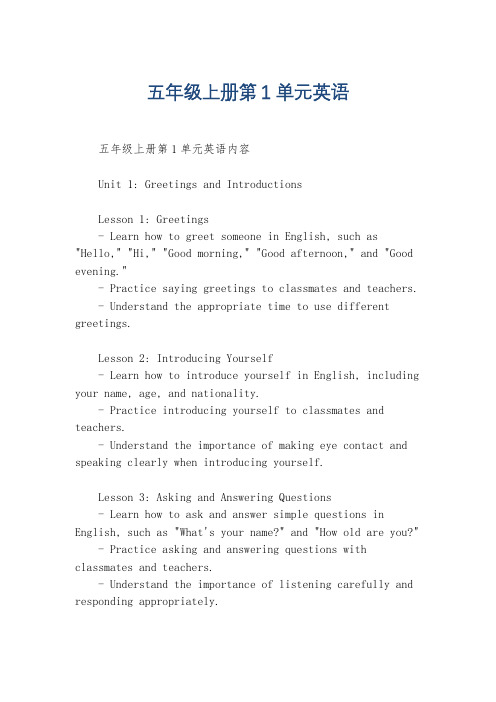
五年级上册第1单元英语五年级上册第1单元英语内容Unit 1: Greetings and IntroductionsLesson 1: Greetings- Learn how to greet someone in English, such as "Hello," "Hi," "Good morning," "Good afternoon," and "Good evening."- Practice saying greetings to classmates and teachers. - Understand the appropriate time to use different greetings.Lesson 2: Introducing Yourself- Learn how to introduce yourself in English, including your name, age, and nationality.- Practice introducing yourself to classmates and teachers.- Understand the importance of making eye contact and speaking clearly when introducing yourself.Lesson 3: Asking and Answering Questions- Learn how to ask and answer simple questions in English, such as "What's your name?" and "How old are you?" - Practice asking and answering questions with classmates and teachers.- Understand the importance of listening carefully and responding appropriately.Lesson 4: Classroom Commands- Learn common classroom commands in English, such as "Sit down," "Stand up," "Open your book," and "Close your book."- Practice following and giving commands in the classroom.- Understand the importance of following instructions and being respectful in the classroom.Lesson 5: Polite Expressions- Learn polite expressions in English, such as "Please," "Thank you," "You're welcome," and "Excuse me." - Practice using polite expressions in different situations.- Understand the importance of being polite and respectful in daily interactions.Lesson 6: Farewells- Learn how to say goodbye in English, such as "Goodbye," "See you later," and "Take care."- Practice saying farewells to classmates and teachers. - Understand the appropriate time to use different farewell expressions.Throughout the unit, students will engage in various activities to reinforce their understanding and usage of the greetings, introductions, questions, commands, polite expressions, and farewells. These activities may include role-plays, group discussions, games, and worksheets. Additionally, students will be encouraged to practice their English skills outside the classroom by greeting others in English and using the newly learned expressions in daily life.。
新编剑桥商务英语(高级)第三版1.2-1.3
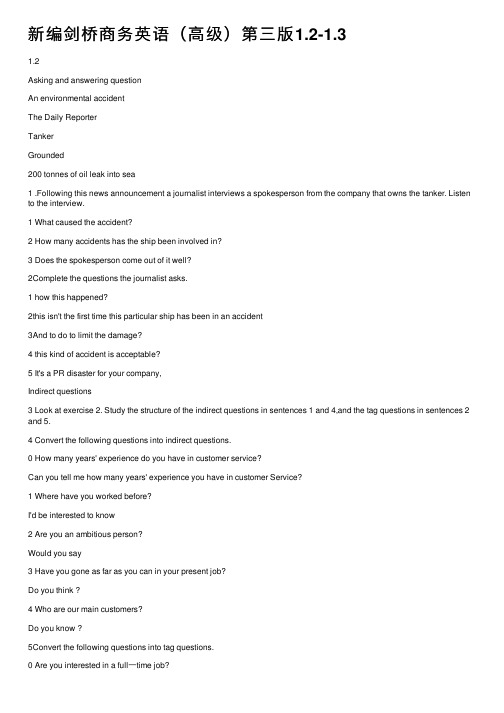
新编剑桥商务英语(⾼级)第三版1.2-1.31.2Asking and answering questionAn environmental accidentThe Daily ReporterTankerGrounded200 tonnes of oil leak into sea1 .Following this news announcement a journalist interviews a spokesperson from the company that owns the tanker. Listen to the interview.1 What caused the accident?2 How many accidents has the ship been involved in?3 Does the spokesperson come out of it well?2Complete the questions the journalist asks.1 how this happened?2this isn't the first time this particular ship has been in an accident3And to do to limit the damage?4 this kind of accident is acceptable?5 It's a PR disaster for your company,Indirect questions3 Look at exercise 2. Study the structure of the indirect questions in sentences 1 and 4,and the tag questions in sentences 2 and 5.4 Convert the following questions into indirect questions.0 How many years' experience do you have in customer service?Can you tell me how many years' experience you have in customer Service?1 Where have you worked before?I'd be interested to know2 Are you an ambitious person?Would you say3 Have you gone as far as you can in your present job?Do you think ?4 Who are our main customers?Do you know ?5Convert the following questions into tag questions.0 Are you interested in a full⼀time job?You're interested in a full-time job ,are not you?1 Are you married?2 Can't you start tomorrow"?3 have you only worked for smaller companies?4 Did you manage to find our offices easily'?5 Is this your first real job?6 Would you be able to work part-time?A job interview6 How would you feel if you were asked these questions? How would you reply?1 Can you tell me why you think you'll be good at this job?2 Why should I employ you?3 You don't have much experience in this field, do you?4 You've taken quite a lot of time out from work .Why is that?5 You are quite a quietly-spoken person. Do you have trouble asserting yourself?G Now, your last job. Did you choose to leave?7 And what do you know about our company?8 So tell me what you did yesterday.7 Work with a partner. Each choose one of the following jobs to be interviewed for. Prepare five questions each and then lake it in turns to adopt the role of interviewer and interviewee. Try to put your interviewee `on the spot: firefighter restaurant manager web designerfundraiser for local sports club trainee investment advisor1.3Reading Test: Introduction andPart OneThe Reading Test has six parts, in which there are a total of 52 questions, and Lasts one hour. It carries 25% of the total marks. The texts are all business-related and vary between 150 and 500 words in length. Each part tests a particular reading skill or understanding of language structure.In the exam, you have an hour to read over 2,000 words, so try to develop your reading speed. The only way to do this is to practise:.Read English business texts, e g Time, Newsweek..Get your news from English Internet sites, e g the BBC, CNN.Part Text tune Skill focus Task1 Single text or 5 Beading for global meaning; Matching summariesshort texts (450 summarising to each section of textwords2 Single text (460- heading for detail; Inserting missing500 words) understanding structure sentences into text3 Single text(500- Reading for general meaning 4-part multiple choice600 words) and specific detail comprehension question 4 Single text (250 Understanding meaning and Gap-fill; multiple words) grammar of individual words choice (4-choice)5 Single text (250 finding missing words to Open gap-fill onewords} give meaning and cohesion Word per gap)6 Single teat (150- understanding grammatical Identifying incorrect of200 words) structure unnecessary words Past OnePart One is a test of reading for gist or global meaning. five texts or sections have to be matched to live sentences that summariese the general view being expressed in each. Follow these steps·Read the instructions twice and make sure you understand the context of the passages) and what you are being asked to do. .Do not read the summaries first.·Bearing in mind what general information you are looking for, read the first text }umlthen try to summarise, in your head, the general view it expresses.·Now read the summaries and lind the one chat matches your own mental summary. ·repeat this procedure for each of the other four texts.summarising1 Write a one-sentence summary for this passage. Compare your answer with your partner.I favour a direct approach to interviewing where the questions really put the candidate under pressure and test their reactions. If you look at manuals on interviewing technique, you'll find that most advise you first to make the candidate feel at ease, and then to ask open-ended questions that give them the freedom to tall; and express themselves as they would like. But I think we're being far too nice here. By allowing people to dictate the direction of the interview, we run the risk of not discovering who they really are and wasting everyone's time.2 Following the approach described above, do this Reading Test Part One. Give yourself about twelve minutes.PART ONEQuestions 1-8. Look at the sentences below and at the five extracts from an article on employee motivation..Match each statement 1-8 to one of the extracts (A, B, C, D or E)..you will need to use some of the letters more than once..There is an example at the beginning (0).Example:1Job satisfaction is the key to an employee's motivation. D1 Companies usually try to motivate employees with extra payment or verbal praise.。
会议提问 (2)asking and answer questions

(3) The validity of the theory has become obvious in the light of recent findings. Perhaps I could give you more examples concerning this. (Use subjunctive mood)
C. Throw the ball back to the questioner Example Question: Do you think Chinese culture has become Americanized? Answer 1: Why hasn’t American culture become like Chinese? Answer 2: Well, I wonder/could you tell me why you ask me such a question? Answer 3: I don’t think so. Could I have your comments on/opinion about it? Answer 4: This is a tough/challenging question. What do you suggest?/ How would you answer this question as a Chinese/an American/a third party…?
(2) Are you still going on building the ground station? obtain information about the establishment of ground station. “yes” or “no” ? If the answerer says “yes”, it is meant that he has been building ground stations while the answer “no” will show that he built ground stations before. “We have never built any ground station.”
Unit 8 Asking & Answering Questions
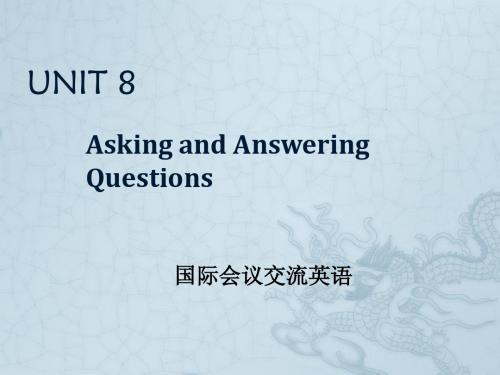
Now, we shall discuss the question and answer session from two angles: (1) from the angle of the presenter handling questions (2) from the angle of the questioner raising questions.
1.5 Replying clearly, briefly and positively
Whether one member of the audience raise a question, he or she is probably expecting a succinct, tothe- point answer. If the person spends all the question time in answering this question, others in the audience would become crazy and this would make the presenter look like an idiot. Generally, about ten to twenty seconds is plenty of time to adequately answer a question. There are many kinds of questions, each with its own use. We will discuss how to successfully handle all kinds of questions.
This is a very good question. Thank you for that question. I am glad that this question has been brought up. This is a hard question. This is a big question. I will try to answer this question very briefly. In answer to your question, I would say that… My answer to your first question is… I have only a partial answer to your question. Thank you for that question. This is a challenging question and I am afraid that I can only provide a partial answer to it. Anyway, I’ll try my best to anur questioners
结合对话回答问题英语作文
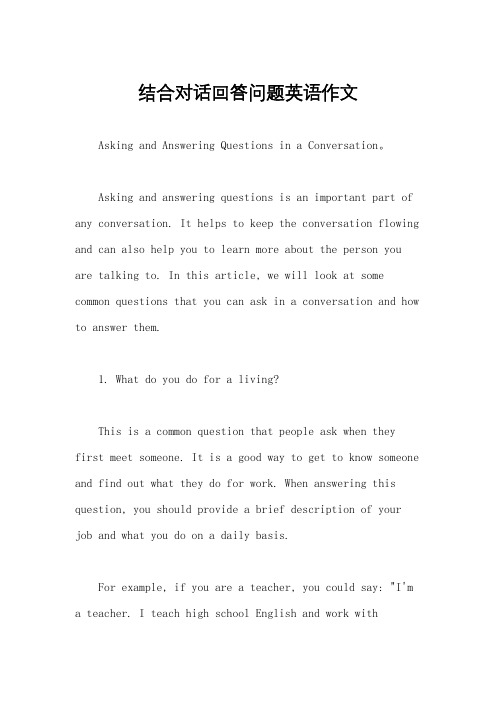
结合对话回答问题英语作文Asking and Answering Questions in a Conversation。
Asking and answering questions is an important part of any conversation. It helps to keep the conversation flowing and can also help you to learn more about the person you are talking to. In this article, we will look at some common questions that you can ask in a conversation and how to answer them.1. What do you do for a living?This is a common question that people ask when theyfirst meet someone. It is a good way to get to know someone and find out what they do for work. When answering this question, you should provide a brief description of your job and what you do on a daily basis.For example, if you are a teacher, you could say: "I'm a teacher. I teach high school English and work withstudents to improve their reading and writing skills."2. What do you like to do in your free time?This question is a great way to find out what someone enjoys doing when they are not working. It can also lead to further conversation about hobbies and interests. When answering this question, try to be specific and provide examples of activities that you enjoy.For example, if you enjoy hiking, you could say: "In my free time, I love to go hiking. There are so many beautiful trails in the area that I like to explore."3. Have you traveled anywhere interesting recently?This question is a great way to find out if someone enjoys traveling and to learn about their recent experiences. When answering this question, be specific about where you have traveled and what you did while you were there.For example, if you recently went to Europe, you could say: "I just got back from a trip to Europe. I visited several countries and saw some amazing sights, like the Eiffel Tower in Paris and the Colosseum in Rome."4. What kind of music do you like?This question is a great way to find out someone's taste in music and can lead to further conversation about concerts and favorite bands. When answering this question, be specific about your favorite genres and artists.For example, if you like rock music, you could say:"I'm a big fan of classic rock. I love bands like Led Zeppelin and The Rolling Stones."5. What do you think about [current event]?This question is a great way to start a conversation about current events and to learn about someone's opinions on important issues. When answering this question, be honest about your thoughts and try to provide reasons foryour opinions.For example, if someone asks you about your thoughts on climate change, you could say: "I think climate change is a serious issue that we need to address. The evidence is clear that human activity is contributing to rising temperatures and we need to take action to reduce our carbon footprint."In conclusion, asking and answering questions is an important part of any conversation. By being specific and honest in your answers, you can help to keep the conversation flowing and learn more about the person you are talking to.。
五年级上册英语课件ppt

Definition
An imperative sentence is a command or request given to someone. It is formed without using a subject (you) and usually ends with an exclamation mark or a question mark. Example: "Go to bed!" or "Please close the door."
English courseware for Grade 5 Volume 1
目录
Course IntroductionVocabulary learningGrammar learningListening and Speaking TrainingReading and WritingCultural knowledge
Unit 5
Writing and grammar review.
Unit 4
Listening and speaking practice.
Unit 3
Expanding vocabulary and reading comprehension.
Unit 1
Introduction to the course and the English language.
Unit 2
Basic grammar and sentence structure.
Lecture method
Teachers will give a lecture on the topic of the unit, introducing relevant knowledge and concepts.
Presentation 英语演讲要素精品PPT课件

Chapter I Beginning the speech text
4. Expressing Pleasure and Honor
I am very happy/glad/pleased to be here in Hong Kong.
I am honored/privileged to be here (with you this afternoon).
Mr. Chairman, thank you very much for your kind introduction. President, Distinguished colleagues, Ladies and gentleman, Good morning! Is my voice loud enough?
I. Opening Remarks开场:
1. Sample Opening Remarks 2. Expressing thanks to the Chair 向主
持人致谢 3. Forms of Address and Greetings 对听
众的称呼 4. Expressing Pleasure and Honor 向听
7
Chapter I Beginning the speech text
2. Expressing thanks to the Chair
Mr. Chairman, thank you for your introduction.
First, I would like to thank Mr. Chairman for his gracious introduction.
Thank you very much, Prof. Fawcett, for your very kind introduction.
《英语教师用书(基础模块)下册》(刘一诺)教学课件 Unit1
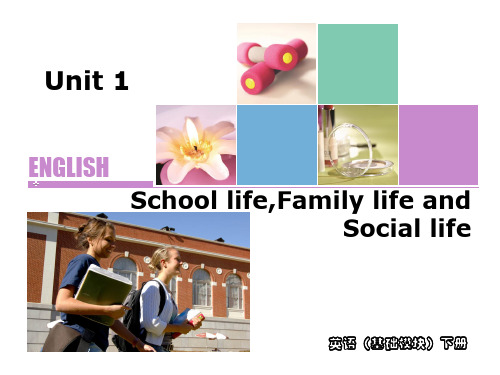
Unit 1 School life,Family life and Social life
Dialogue B Nicole never helps with the house work
❖ 1. Listen to John’s “Can I help you?” live radio show.
Do you do your homework in the afternoon?
Unit 1 School life,Family life and Social life
Dialogue A What are you busy doing?
❖ 1. Listen and read.
播放 暂停/继续 停止
Unit 1 School life,Family life and Social life
❖ 2. Listen again and tick the answers.
1) How is John’s school life?
播放 暂停/继续 停止
□ Busy and boring. □✓ Busy but interesting. □ Easy and interesting.
Answer the questions.
播放 暂停/继续 停止
1) What is Stephanie’s problem? _H__e_r_s_i_st_e_r_n_e_v_e_r_h__el_p_s_w__it_h__h_o_u_s_e_w_o_r_k_.__________________
2) What does John think she should do? _H__e_t_h_in_k__s_S_t_ep__h_a_n_ie__s_h_o_u_ld_n__’t_d_o__h_e_r_s_i_st_e_r_’_s _h_o_u_s_e_w_o_r_k__fo_r__h_e_r.___
国际会议交流英语一般知识概要

国际会议是不同国籍者的会议。
5
Brief Introduction of Conference
Meeting Conference Symposium
Congress
会议
Seminar
Convention
Workshop Colloquium Forum
Meeting——会议,最一般的用词,规模可大可小,层 次可高可低,可以是正式或非正式的聚会,如告别会 议、联席会议、首脑会议、紧急会议等。 6
International Conference on Smart Materials 等
7
Brief Introduction of Conference
Meeting
Conference Symposium
Congress
会议
Seminar
Convention
Workshop
Colloquium
聚众议事
4
Brief Introduction of Conference
一个群体的集会,至少三人,两人的聚会称为“对话”;
必须有主持人,没有人主持的聚会断不能行事;
有一定议事规则,遵循一定规矩,有始有终,发言有
先有后; 有明确的议题,反映共同关心的问题; 有一定的目的,而不是无意识的活动; 有一定的结果; 一种临时性的行为,世界上不存在永无止境的会议。
组织信息 Organizational Information
与会人员信息 会议日程信息 Participants Conference Program Information Information
Abstract:最终期限、长度、格式 participants:与会名额 Agenda:议程 Name Sponsors & Organizers:发起人,主办方 (会议名称) Number of Full Text:最终期限、长度、格式、 for Arrangement of paper presentation:报告安排 Organizing Committee:组委会 attendances:与会资格要求 Date (会议日期) Requirements 影印以及其它一些要求。 Academic Committee:学术委员会 Material distribution:材料发放 Location (会议地点) Conference VIPs (Very Important Persons):特 Model of Presentation:口头报告、 约嘉宾 Secretariat:大会秘书处 Secretarial sections:秘书处办公地点 Topics for Discussion 墙报,报告时间,报告所需条件, Other Members: other facilities: 版权问题等。 Other Committee:如协作单位、赞助单位等 (会议主题)
广东高考听说PartB三问五答技巧指导课件

➢Step3 Asking 3 questions(三问)
小结三问参考答案的特点: 一句多译(多版本答案)
Q1:在大家庭中成长是怎样的? What was(is) it like growing up in a big family? What was(is) growing up in a big family like?
广东听说考试Part B考试策略
PartB三问五答的策略与技巧,
有效把握突破听说难点
Computer-based English Listening and Speaking Test
(CELST)
Part A
Reading Aloud
模仿朗读
Part B
Role Play
角色扮演
Part C
Story Retelling
What are our tasks within the preparation time
(20s)?
1. Complete oral translation from Chinese to English
2. Check questioning details: ✓ Type of Question(疑问句类型) ✓ Order (语序) ✓ Tense (时态) ✓ Subject-verb agreement (主谓一致) ✓ Tone (语调)
Variety in translation 一句多译
1.Variety in choosing words &expressions (词汇) 建议:选择自己最熟悉的词汇,不受汉语表述的限制, 学会转译
Variety in translation 一句多译
2.Variety in choosing sentence structure (句型) 建议:选择自己最有把握的句式
七年级上册英语书第四页的内容
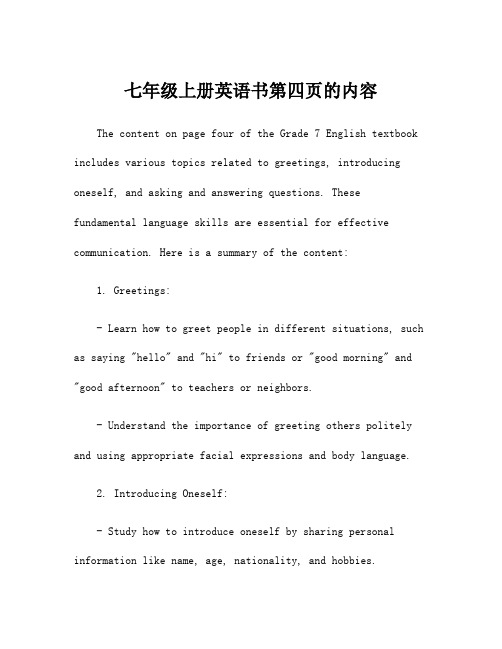
七年级上册英语书第四页的内容The content on page four of the Grade 7 English textbook includes various topics related to greetings, introducing oneself, and asking and answering questions. These fundamental language skills are essential for effective communication. Here is a summary of the content:1. Greetings:- Learn how to greet people in different situations, such as saying "hello" and "hi" to friends or "good morning" and "good afternoon" to teachers or neighbors.- Understand the importance of greeting others politely and using appropriate facial expressions and body language.2. Introducing Oneself:- Study how to introduce oneself by sharing personal information like name, age, nationality, and hobbies.- Practice conversations where students introduce themselves to others and ask questions to get to know each other better.- Learn how to respond to introductions and show genuine interest in others.3. Asking and Answering Questions:- Develop skills in asking simple questions, such as "What's your name?" or "How old are you?"- Learn to provide concise and accurate answers to questions, using appropriate sentence structures.- Engage in interactive exercises and role plays to practice asking and answering questions effectively.4. Basic Conversations:- Explore different dialogue scenarios, including meeting a new classmate, talking to a friend about weekend plans, or asking for directions.- Focus on useful phrases and vocabulary to initiate and sustain conversations.- Practice listening skills by understanding and responding appropriately to conversational cues.5. Writing Skills:- Develop basic writing skills through short exercises, such as writing a paragraph about oneself or writing a greeting card for a friend.- Learn about the importance of clarity, organization, and proper grammar when writing.- Engage in peer editing and revision activities to improve writing skills.These topics establish a foundation for effective communication in English by emphasizing greetings, introductions, oral interactions, and writing skills.Students are encouraged to practice these skills both in and outside of the classroom to become proficient communicators.。
两个同桌互相提问英语作文
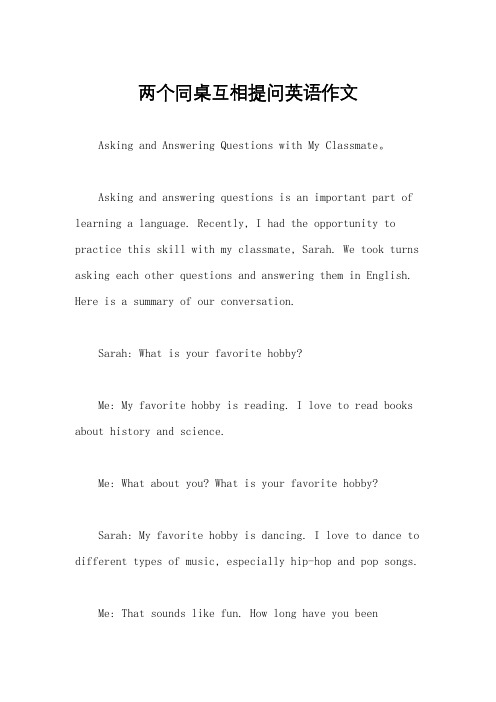
两个同桌互相提问英语作文Asking and Answering Questions with My Classmate。
Asking and answering questions is an important part of learning a language. Recently, I had the opportunity to practice this skill with my classmate, Sarah. We took turns asking each other questions and answering them in English. Here is a summary of our conversation.Sarah: What is your favorite hobby?Me: My favorite hobby is reading. I love to read books about history and science.Me: What about you? What is your favorite hobby?Sarah: My favorite hobby is dancing. I love to dance to different types of music, especially hip-hop and pop songs.Me: That sounds like fun. How long have you beendancing?Sarah: I have been dancing since I was six years old. I started with ballet, but now I focus on hip-hop and modern dance.Sarah: What is your favorite food?Me: My favorite food is sushi. I love the combination of rice, seaweed, and fresh fish.Me: What is your favorite food?Sarah: My favorite food is pizza. I love the taste of melted cheese and tomato sauce on a crispy crust.Me: Do you have any siblings?Sarah: Yes, I have one younger brother. He is in middle school.Sarah: Do you have any siblings?Me: No, I am an only child.Me: What is your favorite subject in school?Sarah: My favorite subject is English. I love reading and writing stories in English.Sarah: What is your favorite subject in school?Me: My favorite subject is math. I enjoy solving problems and using logic to find solutions.Me: Where would you like to travel to?Sarah: I would like to travel to Japan. I am interested in Japanese culture and food.Sarah: Where would you like to travel to?Me: I would like to travel to Europe. I want to see the historical landmarks and learn about different cultures.Overall, asking and answering questions with my classmate was a great way to practice my English skills. It was interesting to learn more about Sarah's hobbies, family, and interests. I look forward to having more conversations like this in the future.。
英语演讲教程-AskingandAnsweringQuestions
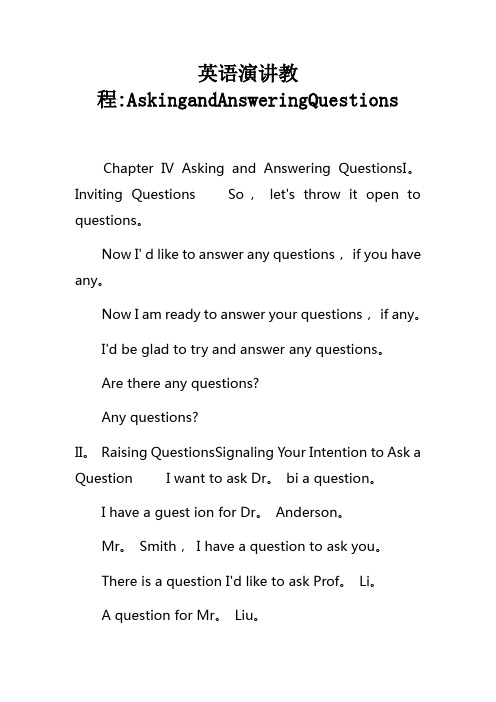
First, I'd like to say your research is very interesting。 May I ask two questions? Do you see any relation between cigarette smoking and peptic ulcers? And what advantage do you expect by using this approach?
Congratulations, Dr。 Li。 I can't help but
admire your achievement。 But I want to know what's your attitude toward abuse of antibiotics?
I'd like to congratulate Mr。 Liu on a very interesting presentation。
I'm not quite surge what your question is。
I didn't quite get the last point of your question。
You mean, there may be some mistake in the calculation?
Are you referring to the significance of the difference?
I can only provide a partial answer to that
- 1、下载文档前请自行甄别文档内容的完整性,平台不提供额外的编辑、内容补充、找答案等附加服务。
- 2、"仅部分预览"的文档,不可在线预览部分如存在完整性等问题,可反馈申请退款(可完整预览的文档不适用该条件!)。
- 3、如文档侵犯您的权益,请联系客服反馈,我们会尽快为您处理(人工客服工作时间:9:00-18:30)。
English for International Conference Communication
Asking and answering questions
Features of question-raisers
• Insiders in the field • Familiarity with the presentation content • Intention of fault-finding
common questions
• What are the methodological limitations in this study and how would you correct them given unlimited time and money?
• What did you like best and least about this study? • What did you learn from this project?
needed
Is that clear to you? Am I making myself clear? Did I make everything clear?
Questions for raising different opinions
• Perhaps we’re looking at the problem from different viewpoints. To the best of my knowledge, what you say seems to be theoretically unclear in… For example, … Could you give us further explanation on that aspect.
• Please discuss how your findings fit or don’t fit with your theoretical framework.
• What recommendations and implications are there for practitioners in your discipline?
• I’m afraid that our different views on the point may come from the different angles from which we’re looking at the problem. My idea is mainly out of the theoretical considerations, specifically, on the basis of the following three aspects: the first point is…
Three steps to answer this kind of question
• Repetition of the question • Answer the question: to offer the information or
explanation called for • Reassurance: to see if further explanation is
Questions for information-hunting
Examples
• Question: As you mentioned in your talk, you’re making the experiments on… I’m not specialized in the subject, but I’m sure it will involve a rather complicated technological process. Would you mind telling us more about that?
Answers to information-hunting questions
• As I said in my speech, we haven’t yet finalized the results of the entire experiment because some of the technical indexes to be measured are still under way. So I’m afraid it’s a bit difficult for me to present any more quantitative information at the moment. But I can tell you the framework of the experiment if you are interested, and I would like to inform you of the final results as soon as the experiment is finished. And I also hope to communicate with you in exchanging this kind of information in the years to come…
• What recommendations do you have for future research?
• What specific aspects of your findings can be utilized by … in their practice?
• What is the most important contribution of your thesis? Can you say it in one or two sentences?
Answers to quesjudging from your question, I can see that your understanding of my viewpoints seems to be somewhat different from my original intention. That awkwardness was due to the so short time that I couldn't put it clearly. Here I’d like to explain it briefly. My original intention is…
Answers to ordinary questions
Question: I don’t quite understand what you really mean by saying …. Can you explain it again?
Answer: To answer your question, I’d like to repeat the third point of what I said just now. well, I was saying…
• How would you interpret these findings in light of the _______ Theory?
• In other words, be able to interpret your findings based on any of the authors that you mentioned in your Literature Review.
Questions for showing special interest
• I’m very much interested in hearing your presentation today since the work we are going to start has some connections with yours. Now, would you please say a few more words about the …? Particularly at its preliminary [pri'liminəri]stage?
Questions raised due to other reasons
• If you were to do it all over again, what changes would you make?
• Are there any closing comments you would like to make? (Mention how much you have learned through the research and show your thanks to each committee member).
Questions for clarifying problems
• I don’t quite understand what you really mean by saying “…”. Can you explain it again?
• I would like to ask you a question, or rather, make a request. Is it possible for you to show me again your last slide?.
